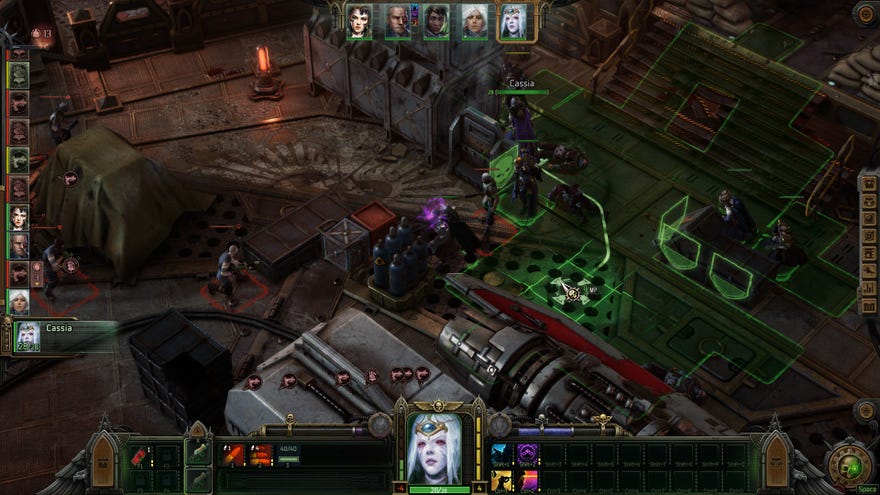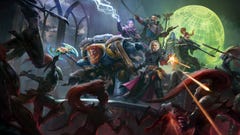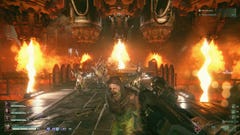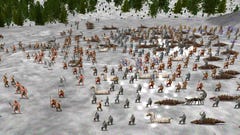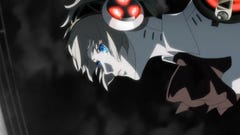Rogue Trader is the first Warhammer 40K game I've played that feels genuinely epic
A review-in-progress of Owlcat's latest CRPG
In the grim darkness of the far future… I will finish my review of Owlcat’s Warhammer 40,000: Rogue Trader. It turns out that trying to complete an estimated 100-hour RPG during the run-up to The Game Awards is too much for this humble Scriptor. There are still many more tabletop-style planetary maps to discover and plunder, many more character levels to scale, and many more cursed artefacts to tamper with before my protagonist, the closet Chaos worshipper Bruschetta de Plonque, can pronounce herself mistress of the Kronos Expanse - assuming the Inquisition doesn’t claim her first. But after 20 hours of the game, I can absolutely say that I’m looking forward to the next 80. While it doesn’t have the cinematic swagger and raw anecdote-generating capacity of obvious rival Baldur's Gate 3, Rogue Trader has mystique and depth to spare, both in terms of its grotty narrative and its exceedingly busy combat and levelling systems.
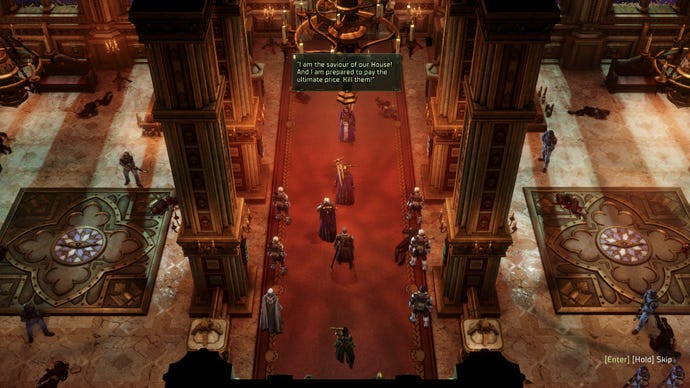
The depth is a mild shock, to be honest. Warhammer 40K is arguably the ultimate work of sci-fantasy greebling. Its "High Gothic" universe appears nightmarishly storied, bristling with spires and skulls and scrolls and seals, with ancient, cathedralic voidships and battle machines that have actual souls. But in practice, of course, it can be brutally simplistic. It’s about a bunch of big stupid space empires that exist on a permanent war footing, each shaped and structured by blunt hatred of the rest. Even today, after however many cross-media adaptations and spin-offs, you can see that this setting began life as a gleefully ham-fisted joke about the draconian tendencies and colonial nostalgia of Thatcherite Britain. There's a heck of a lot of writing involved but, for my money, the writing is often an extension of the greebling – literally, in the case of the faux-Latin text etched into monuments and weapons – and that is how things come across in many Warhammer 40K videogames, even those that don’t fixate on the spectacle of chainswords and bolters. Rogue Trader is one of the few I’ve played that earnestly digs into this world and tries to develop characters and plotlines, and it’s quietly compelling so far.
Above all, that’s because it gives you enough license and leeway that those stories actually have time to evolve. As the titular Rogue Trader, you have limited permission from the God-Emperor to pursue personal glory, amass a power base consisting of a private voidship and planetary colonies, and experiment with Chaotic forces and other heretical pursuits that would otherwise be deemed grounds for execution - as long as this works out to the benefit of the Imperium eventually.
You can have other people executed at the drop of a hat, or more accurately a head, and there are smaller opportunities to play tyrant throughout dialogue: I once had my ship’s comms officer lashed for accidentally ending a conference call early. But you yourself can get away with quite a lot, despite being surrounded by devout servants of the Imperium. Here are some things I’ve done in full view of my party and crew: accepted a demonic apparition’s offer of help; stabbed some malfunctioning Servitors with a cursed blade, harvesting their souls, during one of the game’s choose-your-own-adventure style storybook interludes; opened negotiations with some cutthroats who are either Chaos worshippers or happy to work with them.
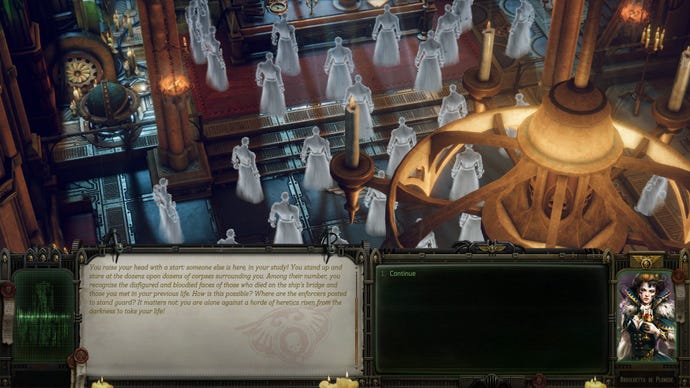
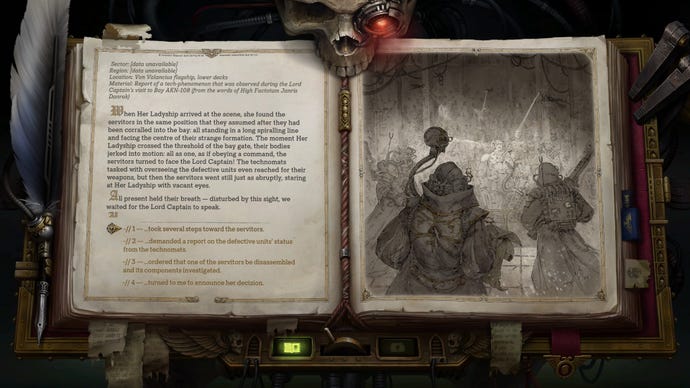
My character Bruschetta is, I think, pretty obviously a Wrong ‘Un. She’s a spaceborn aristocrat with contagious bad luck that is alternately helpful and a hindrance in combat. Character creation includes a choice of Triumphs and Darkest Hours that comprise your backstory: Bruschetta’s Darkest Hour is that her family library contains a mysterious tome that has somewhat wrecked her mind. The game also gives you a choice of voice-actors – naturally, I’ve picked the “mad” one which causes Bruschetta to say things like “they will see, oh yes, THEY WILL SEE” when I assign movement orders. But all this misbehaviour has earned me little more than worried looks from Argenta, my group’s ultra-pious Sister of Battle, and some occasional scolding from my Seneschal, Abelard, a stalwart graduate of the Imperial Navy.
This might sound like a cop-out, and perhaps that’s what it’ll prove to be. But the game’s elaborate and exhaustive character writing is sustaining it so far, and that’s mostly because the starting major side characters aren’t the brittle personifications of the underlying alignment system they appear to be. Argenta is the quintessential handsome young fascist on the surface, but she carries a weight of secret sorrow that softens her otherwise dogmatic assessments of the blasphemers we encounter. Abelard manages your voidship with an iron fist – at one point, we had a massive falling-out because I insisted on compromising with some mutinous crew members on the lower levels – but I get the sense he values decisive, clever leadership over devotion to any individual cause. Idira, your psyker or sanctioned Chaos wizard, is driven by a mixture of fear at being possessed by the demonic forces at her command and resentment at being ostracised as a Warp-sensitive, however loyal to the Emperor.
The three are at once bound together and burdened by their memories of Theodora, your exalted predecessor as Rogue Trader, who quits the scene early on in mysterious circumstances, triggering your ascension. Predictably enough, it turns out they didn’t know her quite as well as they thought they did. All these people are, in short, enmeshed in the act of figuring themselves out, and I’m enjoying peeling back their layers as I pursue my not-very-hidden Chaos sympathies. It helps that there’s a pretty clear division in dialogue between heretical remarks that only have a short-term effect, square-bracketed options that permanently affect your overall character alignment, and those that might even trigger a confrontation with a party member.
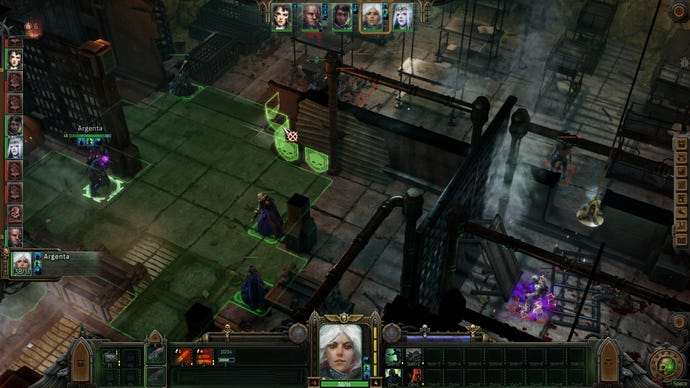
I’m also enjoying the game’s turn-based combat system, though I do have notes. It’s a slightly rickety but engrossing balance of simple and bewildering. On the one hand, this is essentially a game about moving people into full or half-cover and flanking opponents who are trying to do the same. Overarching mechanics include reactive attacks of opportunity when people try to move away during melee, the risk of friendly fire, especially when firing a burst, and a set of class-specific, potentially match-winning Ultimates that become available when you gain enough Momentum from kills or conversely, take enough of a beating.
It almost seems intuitive, from a distance. But on the other hand, each character has dozens upon dozens of abilities spread across various classes and subclasses, which you can stack and combine to transformative effect, and which threaten to wreak all kinds of havoc towards the endgame.
Bruschetta is an Officer, for example, whose starting signature ability lets her choose another party member as her personal minion, applying status modifiers that affect both parties for the duration of the battle. You can expand on this with upgrades that, say, make the officer-minion relationship more defensively inclined, with self-heals that kick in when you’re next to each other, or which unlock combos when you attack the same target. Abelard is a classic lightning bruiser, never happier than when barging forward to bog groups down or occupy the attention of a boss, but he can also be reconfigured as a support, with abilities derived from his Imperial Navy career that scatter enemies who are trying to mob your team. Idira’s psyker powers cause the veil of reality to collapse, unleashing various kinds of demonic activity, but my Navigator, Cassia, has an unlock that repairs the veil when she, say, mesmerises a foe into running towards her. So if I put her and Idira together, I can keep things in equilibrium.
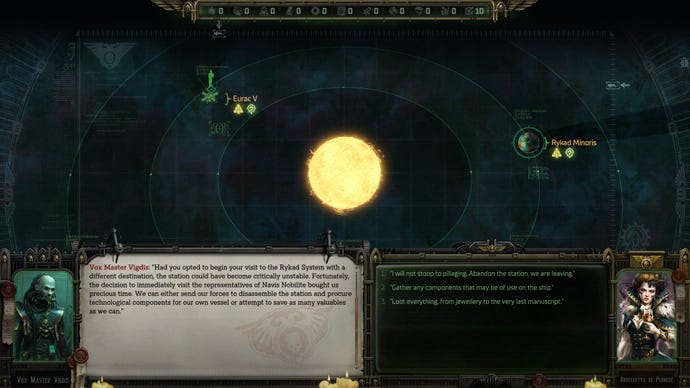
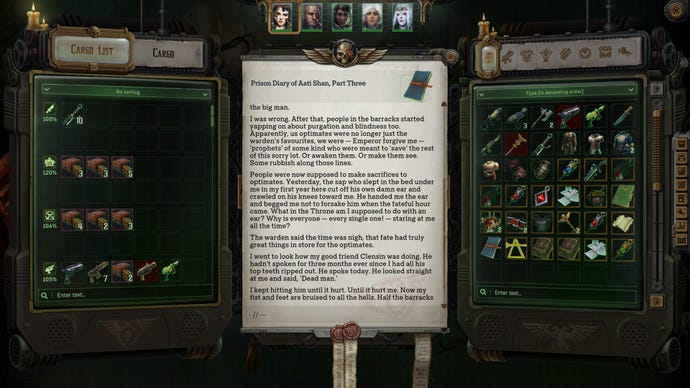
Or at least, I think I can. The obvious downside of all of the above is that Rogue Trader can be absolutely impenetrable, even by RPG standards. The tutorial battles do a solid job of showing you the ropes, but the progression system throws you into the deep end with lengthy lists of unlocks per character level, the applications and overall value of which are difficult to visualise. As you’d expect from a Warhammer game, the UI is a festering expanse of crenellated menus, Latinisms and billions of ability icons perched in nested circles.
The game does recommend certain abilities with thumbs-up icons, but this is akin to a nudge towards the approximate end of a corridor crowded with people bellowing phrases like “+2 temporary wounds per Archetype taken”. If you’re going to play Rogue Trader, be prepared to spend a fair few of those estimated 100 hours with your eyes closed, straining to picture scenarios before choosing an unlock. I’m enjoying the process, but a bit more guidance would have been appreciated. People who get excessive FOMO about choosing the wrong progression path should probably steer clear.
But anybody who’s in the mood for another massive RPG should definitely take an interest, pending my full review. There’s still time for things to go south, mind you. The writing has so far struck a good balance between committing to the worldbuilding, and poking fun at it, but there’s the risk of it becoming over-serious as the stakes are raised. The battle system’s complexities could prove to be inelegant and gratuitous in hindsight. The big thing, for me, is how much choice of alignment changes the story, and how much Owlcat will have to rein in the possibilities as the decisions multiply and evolve. I hope they’re fully committed to unpacking the consequences of Heresy, in particular. I’d hate for daft old Bruschetta to make it to the finishing line unscathed.
